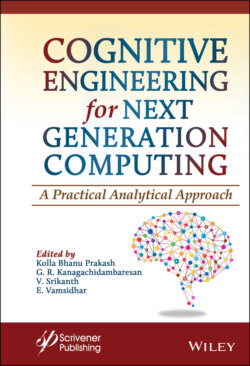Читать книгу Cognitive Engineering for Next Generation Computing - Группа авторов - Страница 60
1.16 Limitations of Cognitive Computing
ОглавлениеLimited Analysis of Risk
The cognitive applications fail flat when examining the unstructured data. There will be a risk with the unstructured data as it incorporates politics, finance, culture, economy, and public. For instance, there is a prescient model that finds an area for oil investigation even though a lot of people objecting it. Yet, if the nation is experiencing a complete change in the government, then human intervention is required as the cognitive system should also consider this and it cannot be done on its own [9].
Rigorous Training Process
These systems require a lot of training initially to comprehend the procedure and improve, but to do this a lot of data is required at the initial stage itself. The adoption is slow because of this lengthy process of collecting the data and training the system. One fine example of this is the training of IBM Watson by WellPoint’s financial management. When the user uses the Watson the text has to be inspected on each medical policy by the company engineers. The medical staff like the nurses has to upload the data regarding the cases until the cognitive system understands the specific medical situation. Also, the mind-boggling and costly procedure of utilizing cognitive frameworks aggravates it even.
More Knowledge Enlargement Instead of Artificial Intelligence
The extent of present cognitive innovation is constrained to commitment and choice. Most of these systems are best as assistants which are increasingly similar to knowledge growth and not as popular as the artificial intelligence applications. It supplements human reasoning and examination however relies upon people to take the final decision. Chatbots and smart assistants becoming popular these days are some fine examples. As opposed to a big business wide selection, such particular activities are a viable path for organizations to begin utilizing cognitive models. In the process of automation, the subsequent step in processing is cognitive computing and it has become popular in every field. The cognitive computing will set standards for the systems to arrive at the degree of the human brain. In the case of innovation, dynamic changes, a significant level of uncertainty it is difficult to apply in these circumstances. The multifaceted nature of the issue develops with the number of information sources. It is trying to total, coordinate, and break down such unstructured information. A complex cognitive arrangement ought to have numerous innovations that exist together to give profound area bits of knowledge.
The enterprises looking to adopt cognitive solutions should start with a specific business segment. These segments should have strong business rules to guide the algorithms, and large volumes of data to train the machines. In the cognitive system more technological advancements should be included so that they can take care of changing real-time data, past data, and also the different types of data (Unstructured, structured, and semi-structured). It will be better if the Kafka, Elasticsearch NoSQL, Hadoop, Spark, etc. become a part of the cognitive systems so that they handle the data problems easily. Any enterprise having a protocol, business domain and huge volumes of company data can adopt these cognitive systems as they are useful in training the system.
Issues With Cognitive Computing: Challenges for a Better Future
Each innovation faces a few issues at some stage in its lifecycle. Technology has a lot of potentials to make an impact on the lives of people, but humans are resisting this innovative technology owing to fear of transform. Individuals are thinking of a few cognitive computing detriments tossing huge difficulties in the way towards more noteworthy implementation, which are given below:
Security
At the point when computerized gadgets oversee basic data, the subject of security naturally comes into the image. With the ability to deal with a lot of information and break down the equivalent, psychological figuring has a critical test concerning information security and encryption. With an ever-increasing number of associated gadgets coming into the scene, cognitive processing should consider the issues identified with security penetrate by building up a full-confirmation security plan that likewise has a system to apprehensive actions to encourage integrity.
Adoption
The greatest obstacle in the way of accomplishment for any innovation is adopting it voluntarily. To make this technology effectively, it is fundamental to build up a future vision of how innovation will improve procedures and organizations. Through a coordinated effort between different partners, for example, innovation engineers, ventures, government, and people, the reception procedure can be smoothed out. Simultaneously, it is basic to have an information protection system that will additionally help the selection of technology.
Change Management
People are resistant to change because of their natural human behavior & as cognitive computing have the power to learn like humans, people are fearful that machines would replace humans someday. This has gone on to impact the growth prospects to a high level. Change the board is another pivotal test for cognitive computing need to overcome for survival. Individuals are impervious to change in light of their normal human conduct and as the technology can be trained like people, individuals are frightful that machines would supplant people sometime in the not so distant future. This has proceeded to affect the development possibilities to a significant level. The technology can work in synchronization with the people and can help them in taking the wise decision sat the right time.
Extensive Advancement Cycles
Probably the best test is the time to put resources into the improvement of situation-based applications through the cognitive approach. It is at present being created as a universal arrangement—this implies the arrangement can’t be executed over different industry fragments without development groups and a lot of time to develop the application.
Extensive advancement cycles make it harder for small organizations to create cognitive capacities all alone. With time, as the improvement lifecycles will in general abbreviate, this technology will gain a greater stage in the future.
